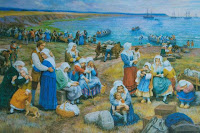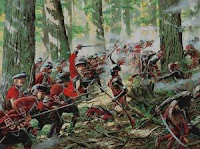- exact revenge on Britain for defeat in the French and Indian War and the loss of Canada.
- defend Catholics in Maryland and Quebec against the potentially hostile Protestant Patriots.
- annex Maine and regain Quebec.
- persuade the Americans to accept King Louis XVIs younger brother as their new constitutional monarch.
Friday, May 27, 2011
France gave a serious consideration to an alliance with the rebel colonies primarily because it saw an opportunity to...
Members of activist groups, such as the Sons of Liberty, were typically...
- leading colonial lawyers and merchants, disguising themselves in order to lead public protests without being identifiable to the authorities.
- unemployed workers with little to lose from rioting.
- artisans, shopkeepers, poor laborers, and seamen.
- members of an underground organization dedicated to winning American independence, who came into the open to direct a revolutionary movement.
During the Great War for Empire...
- American colonial troops strove to emulate the professionalism of the British regulars.
- British officers praised American colonial troops for their courage under fire.
- American colonial troops adapted well to the British system of military discipline.
- deep-seated differences in military discipline emerged between the British officers and the American colonial troops.
The Molasses Act was significant in that it...
- created a thriving new industry in southern port cities such as Charleston and Savannah.
- eroded the profits of the West Indies sugar plantation owners and encouraged New England to export honey, a rival sweetener.
- touched off political clashes between Britain and the colonies, foreshadowing a new era of imperial control.
- angered Americans because it favored British molasses manufacturers.
ANSWER: The Molasses Act was significant in that it touched off political clashes between Britain and the colonies, foreshadowing a new era of imperial control.
Most British merchants responded to colonists' resistance to the Stamp Act by...
- calling for military action against the protesters to re-stabilize trade.
- calling for a return to the old policy of salutary neglect.shifting their trade to the Caribbean and South America.
- supporting the American cause because the colonial boycott led to a drastic decline in their sales.
As a result of the Industrial Revolution in England and the increased marketing of goods in the colonies...
- British merchants extended six months' credit to American shopkeepers.
- Americans consumed about 30 percent of British exports.
- British entrepreneurs exported the new technology to the colonies in order to produce goods more cheaply there.
- the standard of living in Britain increased at the expense of the American consumers.
The Lewis and Clark expedition was dispatched primarily to...
- establish an effective claim to the Louisiana Territory, which Jefferson thought to be insecure until Americans explored the region.
- prepare maps and secretly establish forts in preparation for an American invasion of Mexico.
- report on the physical features and the plant and animal life of the Louisiana Territory, in which Jefferson took a great scientific interest.
- identify areas into which the Indian tribes of the Northwest Territory could be forced to move.
ANSWER: The Lewis and Clark expedition was dispatched primarily to report on the physical features and the plant and animal life of the Louisiana Territory, in which Jefferson took a great scientific interest.
According to Puritan theology, God had...
- saved all humans through the crucifixion of Jesus Christ.
- given each human the capacity for free will in moral decisions.
- given only a few "elect" humans the capacity for free will.
- chosen only a few men and women to be saved.
In the treaty that ended the War of 1812, the United States gained...
- nothing
- a British guarantee that it would not sponsor an Indian buffer state in the Northwest.
- a British promise to never again impress American soldiers during wartime.
- territory in Canada and Florida.
ANSWER: In the treaty that ended the War of 1812, the United States gained nothing.
The first peoples who migrated to the Americas...
- built large, permanent villages.
- were bands of hunter-gatherers
- lived on large, permanent farms.
- did little hunting and mostly gathered edible plants.
The Acadians were...
- Native Americans who were among the closest French allies in the Great War for Empire.
- British troops sent to North America to stiffen colonial defenses after Braddock's defeat in 1755.
- French settlers expelled from Nova Scotia after the British takeover, some of whom eventually made their way to Louisiana.
- Scots-Irish colonists who settled in Nova Scotia after the British expelled the French settlers.
ANSWER: The Acadians were French settlers expelled from Nova Scotia after the British takeover, some of whom eventually made their way to Louisiana.
During the colonial wars of the first half of the eighteenth century, the Iroquois and their allies...
- broke up their confederation under the strain of prolonged warfare.
- abandoned their "covenant chain" of treaties with Pennsylvania tribes.
- adopted a policy of neutrality, exploiting the opportunities for trade with both France and Britain.
- favored the French over the British.
ANSWER: the Iroquois and their allies adopted a policy of neutrality, exploiting the opportunities for trade with both France and Britain.
The first ten amendments to the Constitution are known as the...
- Declaratory Act.
- Declaration of the Rights of Man and Citizen.
- Bill of Rights.
- Judiciary Act of 1789.
ANSWER: Bill of Rights.
Wednesday, May 4, 2011
Which of the following statements most accurately characterizes slavery in the Chesapeake by the mid-eighteenth century?
- Most slaves were born in North America.
- Most slaves were imported to work on tobacco plantations.
- By 1720, slaves represented a majority of the Chesapeake's population.
- Slaves usually came directly from Africa and used their cultural solidarity to force their masters to treat them more humanely than they were treated in the West Indies.
By the 1560s, Spain's main policy in North America was to...
- discover new Indian kingdoms that could be conquered and exploited.
- prevent other European states from establishing bases there, which could threaten Spain's power.
- establish colonies of settlement along the Atlantic coast.
- control the fur trade of the North American interior.
ANSWER: By the 1560s, Spain's main policy in North America was to prevent other European states from establishing bases there, which could threaten Spain's power.
Thomas Jefferson attempted to purchase New Orleans in 1802 and 1803 because...
- Spain refused American farmer's access to ship their products through the port, in violation of the Pinckney Treaty.
- he feared that racial violence in Haiti would spread to America via New Orleans.
- he had arranged a secret deal with Great Britain to use the port as a military staging point for the conquest of French and Spanish islands in the Caribbean.
- he feared Napoleon Bonaparte's plan to establish a French empire in North America.
John Adams recommended a bicameral (two-house) legislature because he believed that...
- one house could not handle the volume of legislative business.
- state power should be divided along social lines.
- two houses would keep the chief executive under control.
- the upper house, consisting of substantial property owners, would check the power of popular majorities in the lower house.
As a result of the fur trade, most Indian tribes of the North American interior...
- grew prosperous and expanded their territory.
- did not become rich, but were able to preserve much of their traditional culture.
- were eager to control it in order to obtain European goods.
- formed alliances with neighboring tribes to hunt and trap more effectively.
ANSWER: As a result of the fur trade, most Indian tribes of the North American interior were eager to control it in order to obtain European goods.
Which of the following statements most accurately characterizes Pontiac's Rebellion?
- It was a failure.
- After the Great War for Empire, Pontiac rebelled because of the continuing encroachments on his people's lands by English-speaking settlers.
- Pontiac called on the Indians to repudiate all European ways and return to their native traditions.
- In the peace settlement of 1763 that Pontiac eventually signed with the British, whites were barred from settling west of the Appalachian Mountains.
ANSWER: In the peace settlement of 1763 that Pontiac eventually signed with the British, whites were barred from settling west of the Appalachian Mountains.
The Spanish conquistadors who followed Columbus to the Americas in the early sixteenth century were primarily driven by...
- a fanatical desire to spread Christianity even at the cost of their own material interests.
- a desire to have areas in the new lands named after themselves.
- obedience to the wishes of the Spanish monarchs who dispatched them on a mission of conquest.
- a thirst for battle and riches as well as land in the conquered territory and titles of nobility.
ANSWER: The Spanish conquistadors who followed Columbus to the Americas in the early sixteenth century were primarily driven by a thirst for battle and riches as well as land in the conquered territory and titles of nobility.
Thomas Jefferson's main purpose in composing the Declaration of Independence was to...
- raise funds from colonial legislatures to carry on the war.
- explain to the British public why Americans were repudiating George III, in the hopes that Britons would stop Parliament and the king from waging a bloody war.
- justify the action of Congress by blaming the rupture on George III.
- persuade pro-Loyalist New York and Georgia to join the Patriot cause.
ANSWER: Thomas Jefferson's main purpose in composing the Declaration of Independence was to justify the action of Congress by blaming the rupture on George III.
Hostilities between French troops and Virginians, led by Colonel George Washington, began in 1754 at...
- Fort Duquesne.
- Williamsburg.
- Quebec.
- Valley Forge.
ANSWER: Hostilities between French troops and Virginians, led by Colonel George Washington, began in 1754 at Fort Duquesne.
Following the conquest of the Aztecs, the Spanish were able to extend their control mostly because of...
ANSWER: Following the conquest of the Aztecs, the Spanish were able to extend their control mostly because of smallpox and other epidemics that decimated the native inhabitants.
Subscribe to:
Comments (Atom)





















